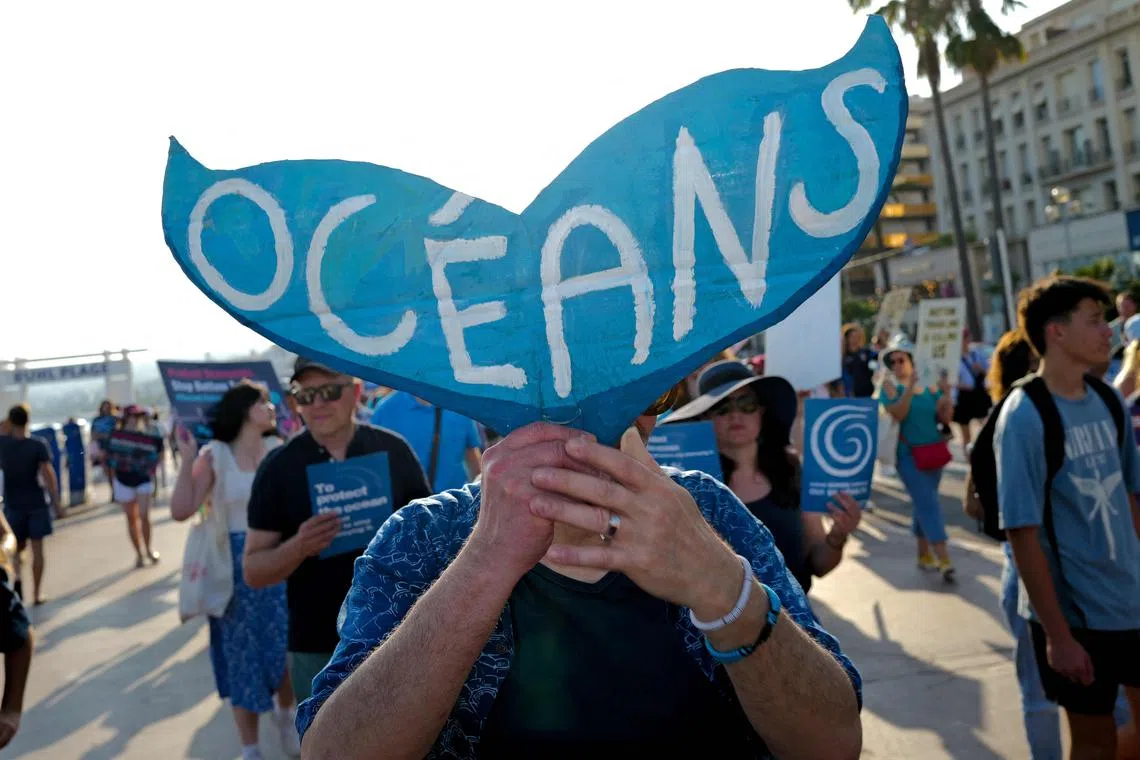Don’t let deep sea become ‘Wild West’, UN chief tells world leaders
Sign up now: Get ST's newsletters delivered to your inbox

World leaders are attending the UN Ocean Conference in Nice as nations tussle over contentious rules on mining the seabed for critical minerals.
PHOTO: AFP
NICE, France - United Nations Secretary-General Antonio Guterres on June 9 said the world could not let the deepest oceans “become the Wild West”, at the start of a global summit on the seas in France.
World leaders are at the UN Ocean Conference in Nice as nations tussle over contentious rules on mining the seabed for critical minerals and the terms of a global treaty on plastic pollution.
US President Donald Trump has brought urgency to the debate around deep-sea mining, moving to fast-track US exploration in international waters and sidestepping global efforts to regulate the nascent sector.
The International Seabed Authority, which has jurisdiction over the ocean floor outside national waters, is meeting in July to discuss a global mining code to regulate mining in the ocean depths.
Mr Guterres said he supported these negotiations and urged caution as countries navigate these “new waters on seabed mining”.
“The deep sea cannot become the Wild West,” he said, to applause from the plenary floor.
Many countries oppose seabed mining, and France is hoping more nations in Nice will join a moratorium until more is known about the ecological impacts of the practice.
French President Emmanuel Macron said a moratorium on deep-sea mining was “an international necessity”.
Wave of commitments
“I think it’s madness to launch predatory economic action that will disrupt the deep seabed, disrupt biodiversity, destroy it and release irrecoverable carbon sinks – when we know nothing about it,” the French President said.
The deep sea, Greenland and Antarctica were “not for sale”, he said in follow-up remarks to thunderous applause.
Mr Macron said a global treaty to govern the high seas had received enough ratifications to enter into force and was “a done deal”, without specifying a timeline.
The agreement, struck in 2023, required ratifications from 60 signatory countries to become international law, and Mr Macron said the numbers “had been reached, which allows us to say that the high seas treaty will be implemented”.
Other commitments on ocean conservation are expected on June 9 in Nice, where around 60 heads of state and government will join thousands of business leaders, scientists and civil society activists.
On June 9, Britain is expected to announce a partial ban on bottom trawling in half its marine protected areas, putting the destructive fishing method squarely on the summit agenda.
Bottom trawling involves huge fishing nets being dragged across the ocean floor, sweeping up everything in their path, a process captured in a recent documentary by British naturalist David Attenborough.
Greenpeace welcomed Britain’s announcement on trawling, but said in a statement it was “long overdue”.
Words into action
Mr Macron said on June 7 that France would restrict trawling in some of its marine protected areas but was criticised by environment groups for not going far enough.
French environment minister Agnes Pannier-Runacher told reporters on June 8 that other countries would make “important announcements” about the creation of new marine protected areas.
Samoa led the way this past week, announcing that 30 per cent of its national waters would be under protection with the creation of nine marine parks.
Just 8 per cent of global oceans are designated for marine conservation, despite a globally agreed target to achieve 30 per cent coverage by 2030.
But even fewer are considered truly protected, as some countries impose next to no rules on what is forbidden in marine zones or lack the finances to enforce any regulations.
Nations will face calls to cough up the missing finances for ocean protection, which is the least funded of all the UN’s 17 sustainable development goals.
Small island states are expected in numbers at the summit to demand money and political support to combat rising seas, marine trash and the plunder of fish stocks.
The summit will not produce a legally binding agreement at its close like a climate COP or treaty negotiation.
But diplomats and other observers said it could mark a much-needed turning point in global ocean conservation if leaders rose to the occasion.
“The UN Ocean Conference gives us all an opportunity to turn words into bold and ambitious action,” said Professor Enric Sala, founder of ocean conservation group Pristine Seas. AFP


